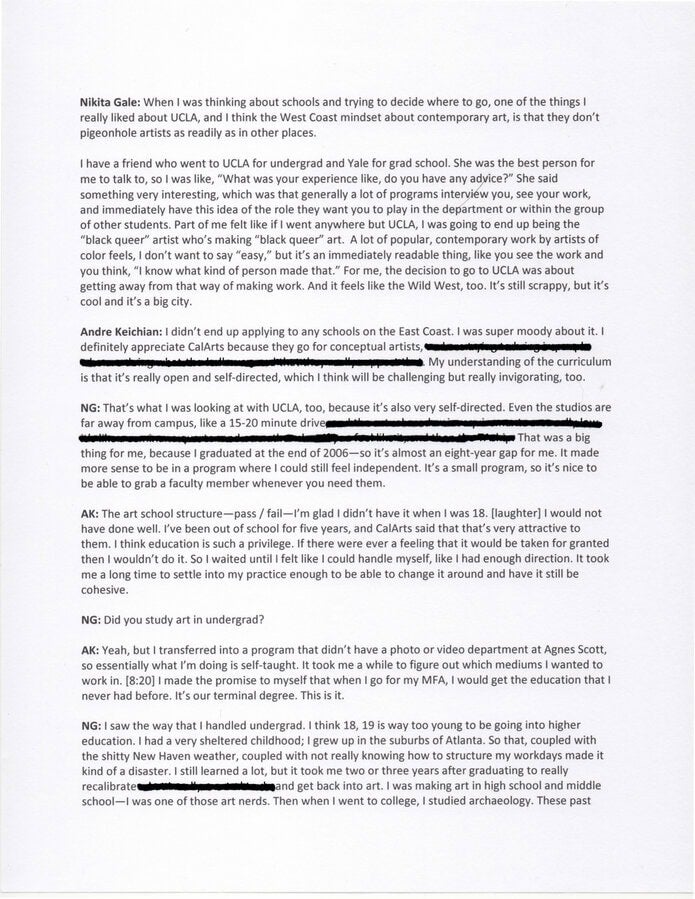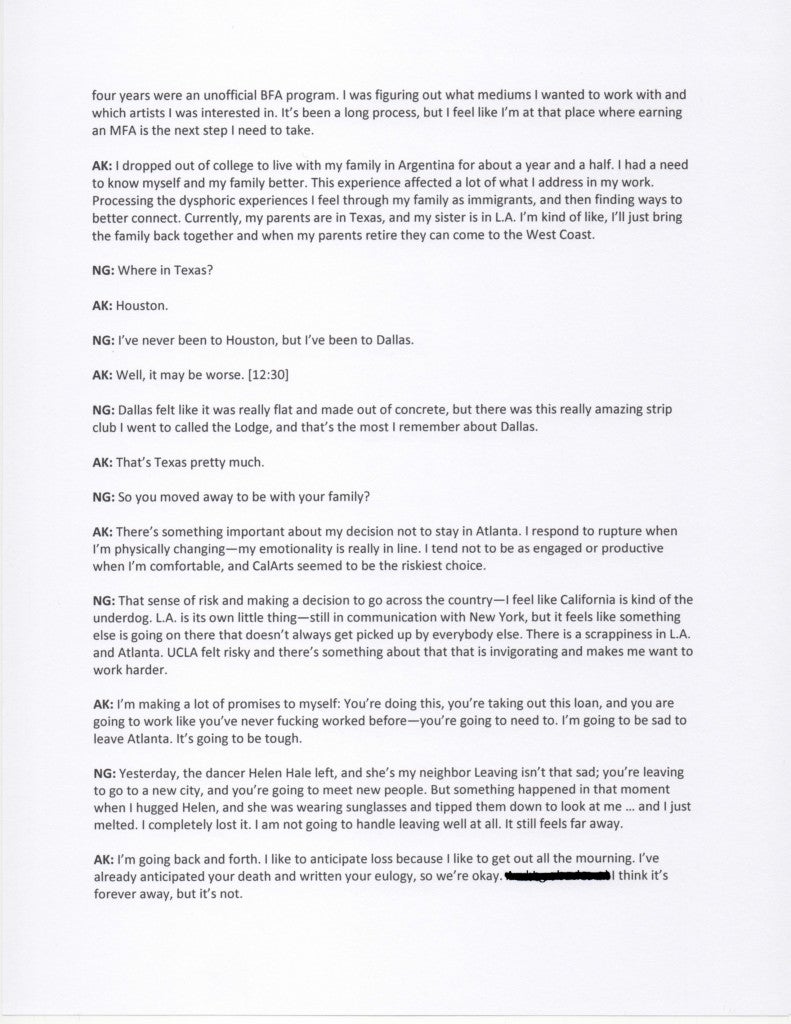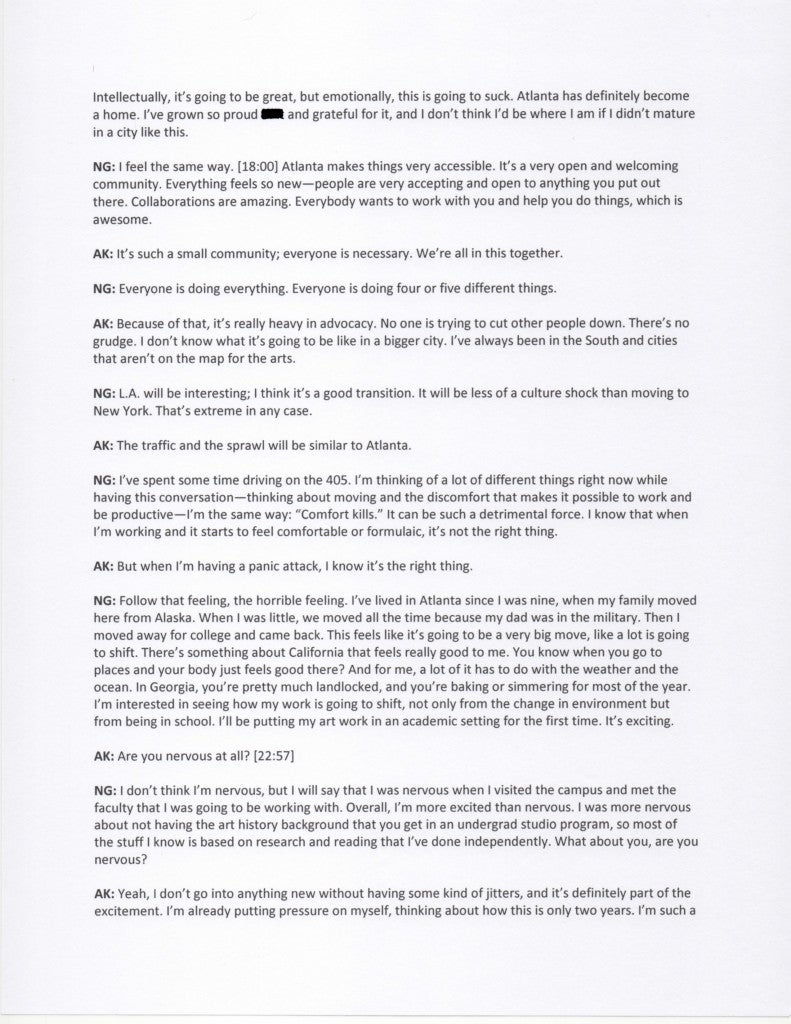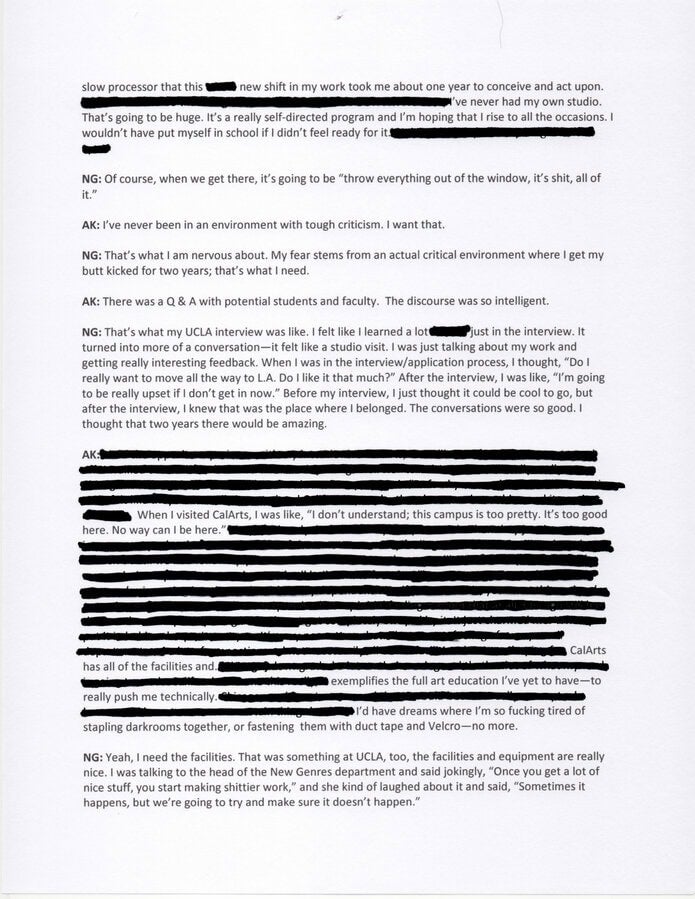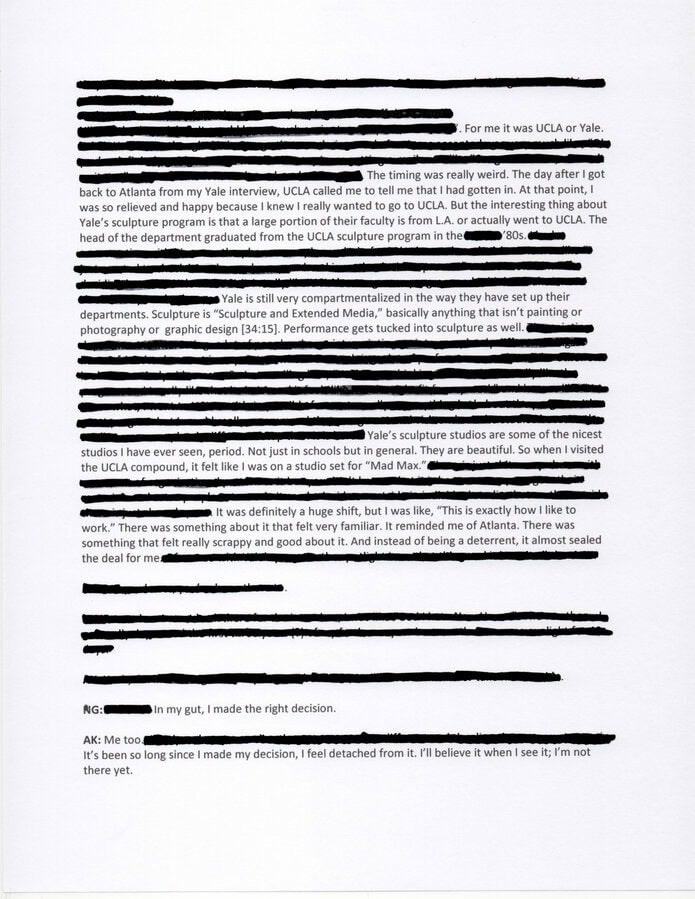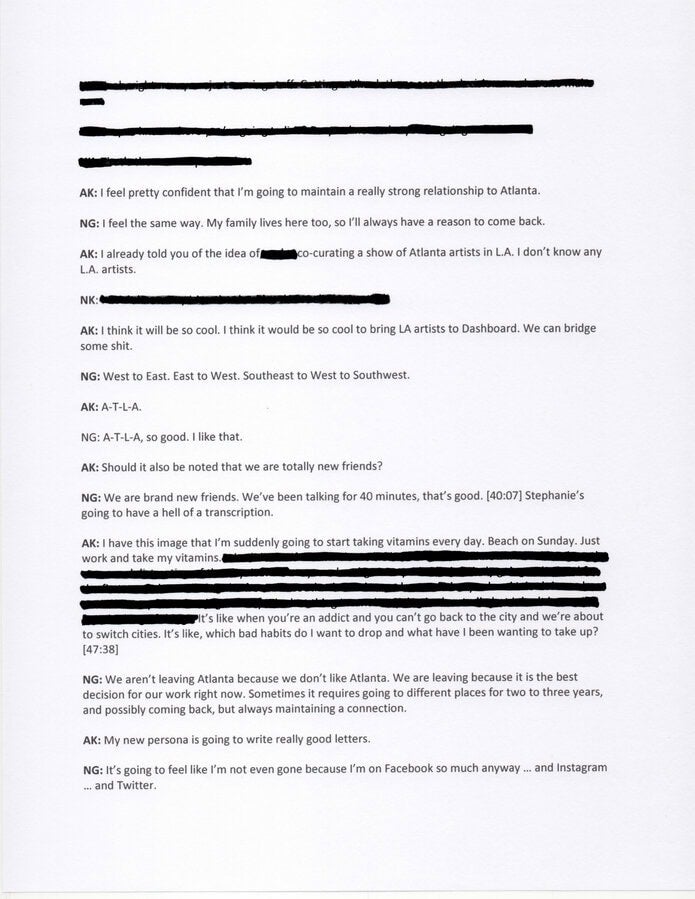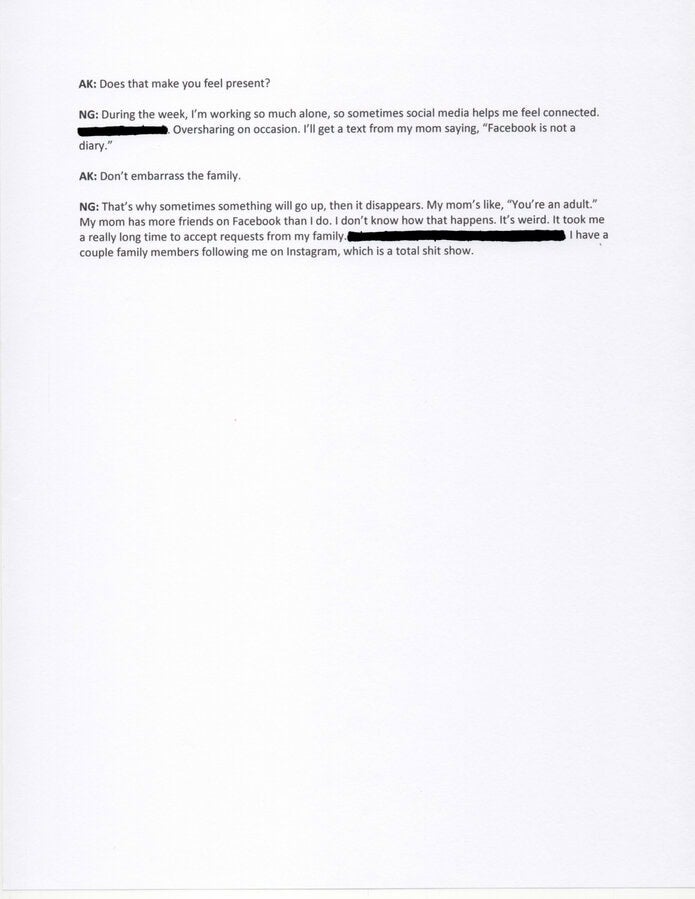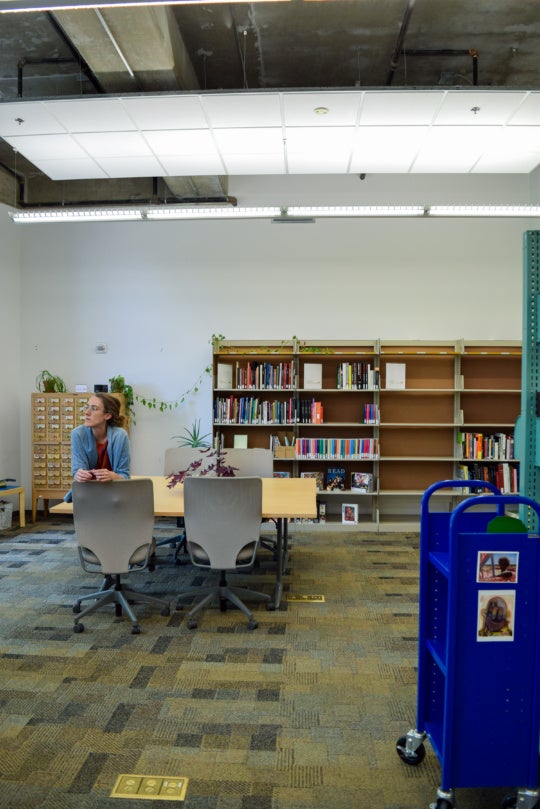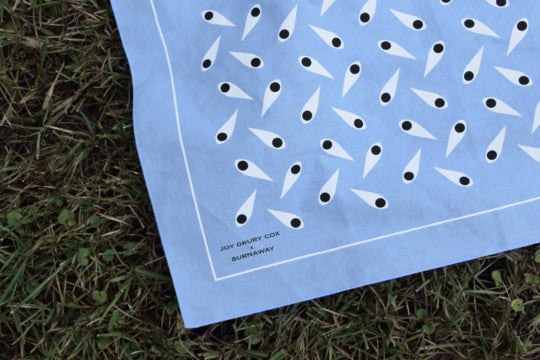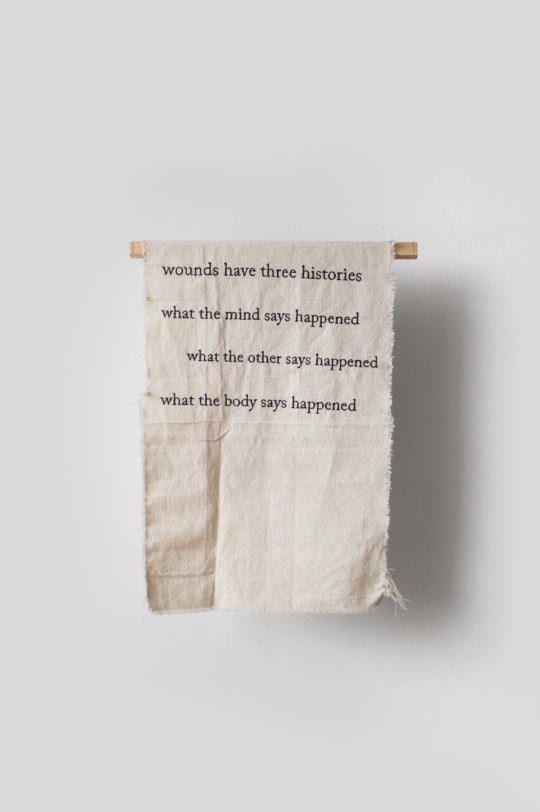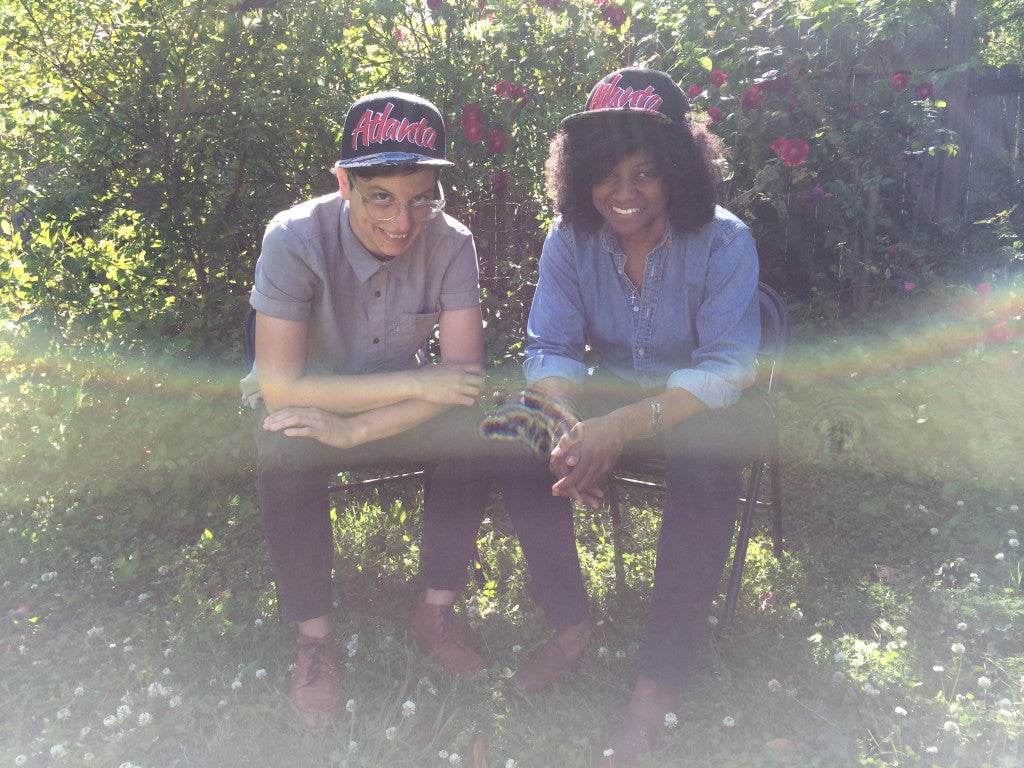
We asked Andre Keichian and Nikita Gale (a BURNAWAY board member) to discuss their decisions to pursue an MFA and to do it somewhere other than Atlanta. Coincidentally, both are heading to California schools in August, Gale to UCLA and Keichian to CalArts. They’ve individually been visible presences on the Atlanta scene. Gale earned her BA in anthropology from Yale University in 2006. She has had solo shows at Poem{88}, in 2012, and Mint, in 2010, and had a studio at the Atlanta Contemporary Art Center. Keichian, who received her BA from Agnes Scott College in 2009, was in the recent Dashboard-Co-op show “COSMS.” They had never met prior to this conversation. Here is a condensed and edited version of their transcript, redacted and formatted by the artists.
Nikita Gale: When I was thinking about schools and trying to decide where to go, one of the things I really liked about UCLA, and I think the West Coast mindset about contemporary art, is that they don’t pigeonhole artists as readily as in other places.
I have a friend who went to UCLA for undergrad and Yale for grad school. She was the best person for me to talk to, so I was like, “What was your experience like, do you have any advice?” She said something very interesting, which was that generally a lot of programs interview you, see your work, and immediately have this idea of the role they want you to play in the department or within the group of other students. Part of me felt like if I went anywhere but UCLA, I was going to end up being the “black queer” artist who’s making “black queer” art. A lot of popular, contemporary work by artists of color feels, I don’t want to say “easy,” but it’s an immediately readable thing, like you see the work and you think, “I know what kind of person made that.” For me, the decision to go to UCLA was about getting away from that way of making work. And it feels like the Wild West, too. It’s still scrappy, but it’s cool and it’s a big city.
Andre Keichian: I didn’t end up applying to any schools on the East Coast. I was super moody about it. I definitely appreciate CalArts because they go for conceptual artists. My understanding of the curriculum is that it’s really open and self-directed, which I think will be challenging but really invigorating, too.
NG: That’s what I was looking at with UCLA, too, because it’s also very self-directed. Even the studios are far away from campus, like a 15-20 minute drive. That was a big thing for me, because I graduated at the end of 2006—so it’s almost an eight-year gap for me. It made more sense to be in a program where I could still feel independent. It’s a small program, so it’s nice to be able to grab a faculty member whenever you need them.
AK: The art school structure—pass / fail—I’m glad I didn’t have it when I was 18. [laughter] I would not have done well. I’ve been out of school for five years, and CalArts said that that’s very attractive to them. I think education is such a privilege. If there were ever a feeling that it would be taken for granted then I wouldn’t do it. So I waited until I felt like I could handle myself, like I had enough direction. It took me a long time to settle into my practice enough to be able to change it around and have it still be cohesive.
NG: Did you study art in undergrad?
AK: Yeah, but I transferred into a program that didn’t have a photo or video department at Agnes Scott, so essentially what I’m doing is self-taught. It took me a while to figure out which mediums I wanted to work in. [8:20] I made the promise to myself that when I go for my MFA, I would get the education that I never had before. It’s our terminal degree. This is it.
NG: I saw the way that I handled undergrad. I think 18, 19 is way too young to be going into higher education. I had a very sheltered childhood; I grew up in the suburbs of Atlanta. So that, coupled with the shitty New Haven weather, coupled with not really knowing how to structure my workdays made it kind of a disaster. I still learned a lot, but it took me two or three years after graduating to really recalibrate and get back into art. I was making art in high school and middle school—I was one of those art nerds. Then when I went to college, I studied archaeology. These past four years were an unofficial BFA program. I was figuring out what mediums I wanted to work with and which artists I was interested in. It’s been a long process, but I feel like I’m at that place where earning an MFA is the next step I need to take.
AK: I dropped out of college to live with my family in Argentina for about a year and a half. I had a need to know myself and my family better. This experience affected a lot of what I address in my work. Processing the dysphoric experiences I feel through my family as immigrants, and then finding ways to better connect. Currently, my parents are in Texas, and my sister is in L.A. I’m kind of like, I’ll just bring the family back together and when my parents retire they can come to L.A.
NG: Where in Texas?
AK: Houston.
NG: I’ve never been to Houston, but I’ve been to Dallas.
AK: Well, it may be worse. [12:30]
NG: Dallas felt like it was really flat and made out of concrete, but there was this really amazing strip club I went to called the Lodge, and that’s the most I remember about Dallas.
AK: That’s Texas pretty much.
NG: So you moved away to be with your family?
AK: There’s something important about my decision not to stay in Atlanta. I respond to rupture when I’m physically changing—my emotionality is really in line. I tend not to be as engaged or productive when I’m comfortable, and CalArts seemed to be the riskiest choice.
NG: That sense of risk and making a decision to go across the country—I feel like California is kind of the underdog. L.A. is its own little thing—still in communication with New York, but it feels like something else is going on there that doesn’t always get picked up by everybody else. There is a scrappiness in L.A. and Atlanta. UCLA felt risky and there’s something about that that is invigorating and makes me want to work harder.
AK: I’m making a lot of promises to myself: You’re doing this, you’re taking out this loan, and you are going to work like you’ve never fucking worked before—you’re going to need to. I’m going to be sad to leave Atlanta. It’s going to be tough.
NG: Yesterday, the dancer Helen Hale left, and she’s my neighbor Leaving isn’t that sad; you’re leaving to go to a new city, and you’re going to meet new people. But something happened in that moment when I hugged Helen, and she was wearing sunglasses and tipped them down to look at me … and I just melted. I completely lost it. I am not going to handle leaving well at all. It still feels far away.
AK: I’m going back and forth. I like to anticipate loss because I like to get out all the mourning. I’ve already anticipated your death and written your eulogy, so we’re okay. I think it’s forever away, but it’s not.
Intellectually, it’s going to be great, but emotionally, this is going to suck. Atlanta has definitely become a home. I’ve grown so proud and grateful for it, and I don’t think I’d be where I am if I didn’t mature in a city like this.
NG: I feel the same way. [18:00] Atlanta makes things very accessible. It’s a very open and welcoming community. Everything feels so new—people are very accepting and open to anything you put out there. Collaborations are amazing. Everybody wants to work with you and help you do things, which is awesome.
AK: It’s such a small community; everyone is necessary. We’re all in this together.
NG: Everyone is doing everything. Everyone is doing four or five different things.
AK: Because of that, it’s really heavy in advocacy. No one is trying to cut other people down. There’s no grudge. I don’t know what it’s going to be like in a bigger city. I’ve always been in the South and cities that aren’t on the map for the arts.
NG: L.A. will be interesting; I think it’s a good transition. It will be less of a culture shock than moving to New York. That’s extreme in any case.
AK: The traffic and the sprawl will be similar to Atlanta.
NG: I’ve spent some time driving on the 405. I’m thinking of a lot of different things right now while having this conversation—thinking about moving and the discomfort that makes it possible to work and be productive—I’m the same way: “Comfort kills.” It can be such a detrimental force. I know that when I’m working and it starts to feel comfortable or formulaic, it’s not the right thing.
AK: But when I’m having a panic attack, I know it’s the right thing.
NG: Follow that feeling, the horrible feeling. I’ve lived in Atlanta since I was nine, when my family moved here from Alaska. When I was little, we moved all the time because my dad was in the military. Then I moved away for college and came back. This feels like it’s going to be a very big move, like a lot is going to shift. There’s something about California that feels really good to me. You know when you go to places and your body just feels good there? And for me, a lot of it has to do with the weather and the ocean. In Georgia, you’re pretty much landlocked, and you’re baking or simmering for most of the year. I’m interested in seeing how my work is going to shift, not only from the change in environment but from being in school. I’ll be putting my art work in an academic setting for the first time. It’s exciting.
AK: Are you nervous at all? [22:57]
NG: I don’t think I’m nervous, but I will say that I was nervous when I visited the campus and met the faculty that I was going to be working with. Overall, I’m more excited than nervous. I was more nervous about not having the art history background that you get in an undergrad studio program, so most of the stuff I know is based on research and reading that I’ve done independently. What about you, are you nervous?
AK: Yeah, I don’t go into anything new without having some kind of jitters, and it’s definitely part of the excitement. I’m already putting pressure on myself, thinking about how this is only two years. I’m such a slow processor that this new shift in my work took me about one year to conceive and act upon. I’ve never had my own studio. That’s going to be huge. I wouldn’t have put myself in school if I didn’t feel ready for it.
NG: Of course, when we get there, it’s going to be “throw everything out of the window, it’s shit, all of it.”
AK: I’ve never been in an environment with tough criticism. I want that.
NG: That’s what I am nervous about. My fear stems from an actual critical environment where I get my butt kicked for two years; that’s what I need.
AK: There was a Q & A with potential students and faculty. The discourse was so intelligent.
NG: That’s what my UCLA interview was like. I felt like I learned a lot just in the interview. It turned into more of a conversation—it felt like a studio visit. I was just talking about my work and getting really interesting feedback. When I was in the interview/application process, I thought, “Do I really want to move all the way to L.A. Do I like it that much?” After the interview, I was like, “I’m going to be really upset if I don’t get in now.” Before my interview, I just thought it could be cool to go, but after the interview, I knew that was the place where I belonged. The conversations were so good. I thought that two years there would be amazing.
AK: When I visited CalArts, I was like, “I don’t understand; this campus is too pretty. It’s too good here. No way can I be here.” CalArts has all of the facilities and exemplifies the full art education I’ve yet to have—to really push me technically. I’d have dreams where I’m so fucking tired of stapling darkrooms together, or fastening with with duct tape and Velcro—no more.
NG: Yeah, I need the facilities. That was something at UCLA, too, the facilities and equipment are really nice. I was talking to the head of the New Genres department, Jennifer Bolande, and said jokingly, “Once you get a lot of nice stuff, you start making shittier work,” and she kind of laughed about it and said, “Sometimes it happens, but we’re going to try and make sure it doesn’t happen.” For me it was UCLA or Yale.
The timing was really weird. The day after I got back to Atlanta from my Yale interview, UCLA called me to tell me that I had gotten in. At that point, I was so relieved and happy because I knew I really wanted to go to UCLA. But the interesting thing about Yale’s sculpture program is that a large portion of their faculty is from L.A. or actually went to UCLA. The head of the department graduated from the UCLA sculpture program in the ’80s.
Yale is still very compartmentalized in the way they have set up their departments. Sculpture is “Sculpture and Extended Media,” basically anything that isn’t painting or photography or graphic design [34:15]. Performance gets tucked into sculpture as well. Yale’s sculpture studios are some of the nicest studios I have ever seen, period. Not just in schools but in general. They are beautiful. So when I visited the UCLA compound, it felt like I was on a studio set for “Mad Max.” It was definitely a huge shift, but I was like, “This is exactly how I like to work.” There was something about it that felt very familiar. It reminded me of Atlanta. There was something that felt really scrappy and good about it. And instead of being a deterrent, it almost sealed the deal for me.
I feel like In my gut, I made the right decision.
AK: Me too. It’s been so long since I made my decision, I feel detached from it. I’ll believe it when I see it; I’m not there yet.
I feel pretty confident that I’m going to maintain a really strong relationship to Atlanta.
NG: I feel the same way. My family lives here too, so I’ll always have a reason to come back.
AK: I already told you of the idea of, we’re co-curating a show of Atlanta artists in L.A. I don’t know any L.A. artists. I think it will be so cool. We can bridge some shit.
NG: West to East. East to West. Southeast to West to Southwest.
AK: A-T-L-A.
NG: A-T-L-A, so good. I like that.
AK: I have this image that I’m suddenly going to start taking vitamins every day. Beach on Sunday. Just work and take my vitamins. It’s like, which bad habits do I want to drop and what have I been wanting to take up? [47:38]
NG: We aren’t leaving Atlanta because we don’t like Atlanta. We are leaving because it is the best decision for our work right now. Sometimes it requires going to different places for two to three years, and possibly coming back, but always maintaining a connection. It’s going to feel like I’m not even gone because I’m on Facebook so much anyway … and Instagram … and Twitter.
AK: Does that make you feel present?
NG: During the week, I’m working so much alone, so sometimes social media helps me feel connected. Oversharing on occasion. I’ll get a text from my mom saying, “Facebook is not a diary.”
AK: Don’t embarrass the family.
NG: That’s why sometimes something will go up, then it disappears. My mom’s like, “You’re an adult.” My mom has more friends on Facebook than I do. I don’t know how that happens. It’s weird. It took me a really long time to accept requests from my family. I have a couple family members following me on Instagram, which is a total shit show.

